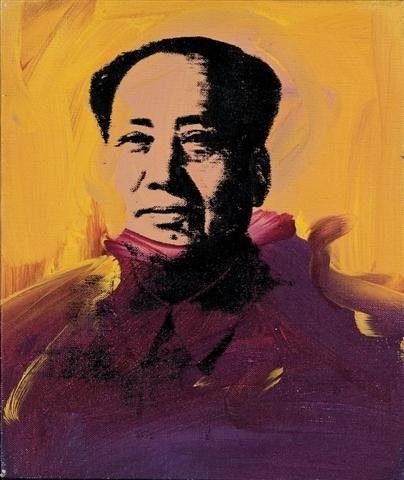Andy Warhol
dal 16/3/2010 al 7/5/2010
Segnalato da
16/3/2010
Andy Warhol
Olyvia Fine Art, London
Portraits. The show displays some of Warhol's most celebrated works alongside previously hidden gems, showcasing Warhol's distinctive style in a vivid and comprehensive collection. Alongside these exclusive portraits there is a rare series of Screen Tests. These enchanting silent films created by Warhol provide a voyeuristic record of the characters that once roamed his factory studio.

Olyvia Fine Art is proud to present ‘Andy Warhol: Portraits’; an unmissable exhibition of
paintings, unique prints and films. Opening in March 2010, the show will display some of
Warhol’s most celebrated works alongside previously hidden gems, showcasing Warhol’s
distinctive style in a vivid and comprehensive collection. Alongside these exclusive portraits
will be a rare series of ‘Screen Tests’. These enchanting silent films created by Warhol
provide a voyeuristic record of the characters that once roamed his factory studio.
A key initiator of the American pop art movement and an avant-garde filmmaker, Warhol
rubbed shoulders with an array of vastly diverse communities, ranging from Hollywood
celebrities and well-heeled aristocrats to reputed academics, cultural figures and trendy
beatniks. The artist’s involvement and interest in radically differing social circles is reflected
in the succession of works that he produced in the twenty years preceding his death in
1987. After a break from painting in the late 1960s, the 1970s saw the reawakening of this
multi-faceted artist as he employed new techniques to paint commissioned portraits of
copious personalities, whether famous or obscure. He quickly became, according to Art
historian Robert Rosenblum, “court painter to 1970s international aristocracy”.
Warhol’s portraiture differs from other more traditional portraiture as the artist believed that
the presentation of a work impresses more upon a viewer than the nature of the work itself.
Being more concerned with the construction of a glamorous surface than the portrayal of his
subject’s character, Warhol sought a specific “look”. Despite the efforts of critics to prove
him wrong and highlight the flaws of this theory, it was precisely this atypical outlook on art
that led to Warhol’s remarkable success.
The exhibition at Olyvia Fine Art will include iconic portraits of Swedish actress Ingrid
Bergman, artists Joseph Beuys and Robert Mapplethorpe, socialites Doda Voridis and
Karen Lerner, athlete Tom Seaver, Chinese political leader Mao Zedong, the reigning
Queen Elizabeth II, and a unique self-portrait accompanied by a photograph of Warhol
taken in 1965 by New York photographer, John McCabe.
Also featured in this exhibition is a selection of thirteen “living portraits” - Screen Tests
which were strung together in a sequence, producing an almost hypnotic reverie that could,
as Warhol once said, “help the audience get more acquainted with themselves.” Warhol’s
Screen Tests, which number approximately 500 in total, are beautiful and revealing portraits
shot between 1964 and 1966. The subjects are Factory denizens and visitors, both famous
and anonymous. Asked to pose, they were recorded by Warhol’s stationary 16mm Bolex
camera on silent, black and white, 100-foot rolls of film. In the early screen tests, Warhol
asked sitters to strive for a “static pose,” which resulted in flat, graphic, meticulously lit, and
nearly entirely stationary images that looked like high-quality studio photographs. Later,
Warhol even considered packaging the Screen Tests as $1000 pieces of living-room art:
“Living Portrait Boxes”. These ‘Screen Tests’ further portray Warhol as a serial portraitist
and exhibitor of bizarre, beautiful, and disturbed individuals.
‘Andy Warhol: Portraits’ reveals a chapter in Warhol’s life that saw a dramatic turn-around in
his work, from the austerity of his 1960s images to what were then perceived as unseemly
observations of shameless glamour. Warhol’s vision and flair resulted in a series of works
that depicted a world captivated by image and celebrity status and consequently caused
uproar amongst critics and ideologists alike, who regarded this form of flagrant glamour a
moral and aesthetic outrage. Today these seductive portraits are considered timeless
classics and are a true example of how Warhol’s originality and controversy deeply marked
the history of portraiture.
Notes to Editors
Olivia Fine Art, formerly Olyvia Oriental, was founded in 2005 by Olyvia Kwok, and quickly
established itself as a leading gallery in contemporary Chinese painting in the UK.
Olyvia Fine Art’s artists have been endorsed by collectors who continue to generate
awareness and appreciation of Asian contemporary art such as Charles Saatchi, Larry
Walsh, Frank Cohen and Herman Heinsbroek. Having successfully promoted the Asian
scene, the gallery has recently expanded its market to include Western Modern and
Contemporary art. Its aim is to show international emerging and established Asian artists in
juxtaposition with Western contemporary artists and their modern forebears.
While embracing this new direction, Olyvia Fine Art continues to represent some of the
most distinguished names from the Orient, alongside young talented Chinese artists who
epitomise extreme and controversial directions in the dynamic contemporary art scene in
China.
Immage: Andy Warhol, Mao, 1973, Acrylic & silkscreen ink on canvas 12 x 10.1 in (30.5 x 25.7 cm)
For further information, please contact:Rachel Phillipps
Email: rachel@pagetbaker.com Tel: +44 (0) 7834 904 571
Opening Night, 16 March, 2010, 6 - 9pm
Olyvia Fine Art
17 Ryder Street, St. James', London



